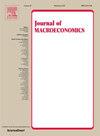效用财富、泰勒原理与确定性
IF 1.3
3区 经济学
Q3 ECONOMICS
引用次数: 0
摘要
效用函数中的财富导致消费者欧拉方程的贴现,扩大了确定性区域,使货币当局更容易保证均衡的确定性。我们证明了一个被动的政策规则,它根据通货膨胀率调整名义利率,如果适当指定,由于泰勒原则和均衡确定性的需求通道的存在,它能够排除均衡不确定性。此外,为了避免不确定性,货币政策规则在多大程度上可以是被动的,这在很大程度上取决于对财富的偏好程度以及模型的基本结构和参数。本文章由计算机程序翻译,如有差异,请以英文原文为准。
Wealth in utility, the Taylor principle and determinacy
Wealth in the utility function leads to the discounting to consumer’s Euler equation, enlarging determinacy regions and making it easier for the monetary authority to ensure equilibrium determinacy. We show that a passive policy rule which adjusts nominal interest rate by less than one-for-one in response to the inflation rate is able to rule out equilibrium indeterminacy, if properly specified, due to the presence of the demand channel of the Taylor principle and equilibrium determinacy. Furthermore, the extent to which monetary policy rule can be passive in order to avoid indeterminacy depends critically on the degree of preference over wealth as well as the underlying structures and parameters of the model.
求助全文
通过发布文献求助,成功后即可免费获取论文全文。
去求助
来源期刊

Journal of Macroeconomics
ECONOMICS-
CiteScore
2.50
自引率
7.10%
发文量
53
审稿时长
76 days
期刊介绍:
Since its inception in 1979, the Journal of Macroeconomics has published theoretical and empirical articles that span the entire range of macroeconomics and monetary economics. More specifically, the editors encourage the submission of high quality papers that are concerned with the theoretical or empirical aspects of the following broadly defined topics: economic growth, economic fluctuations, the effects of monetary and fiscal policy, the political aspects of macroeconomics, exchange rate determination and other elements of open economy macroeconomics, the macroeconomics of income inequality, and macroeconomic forecasting.
 求助内容:
求助内容: 应助结果提醒方式:
应助结果提醒方式:


